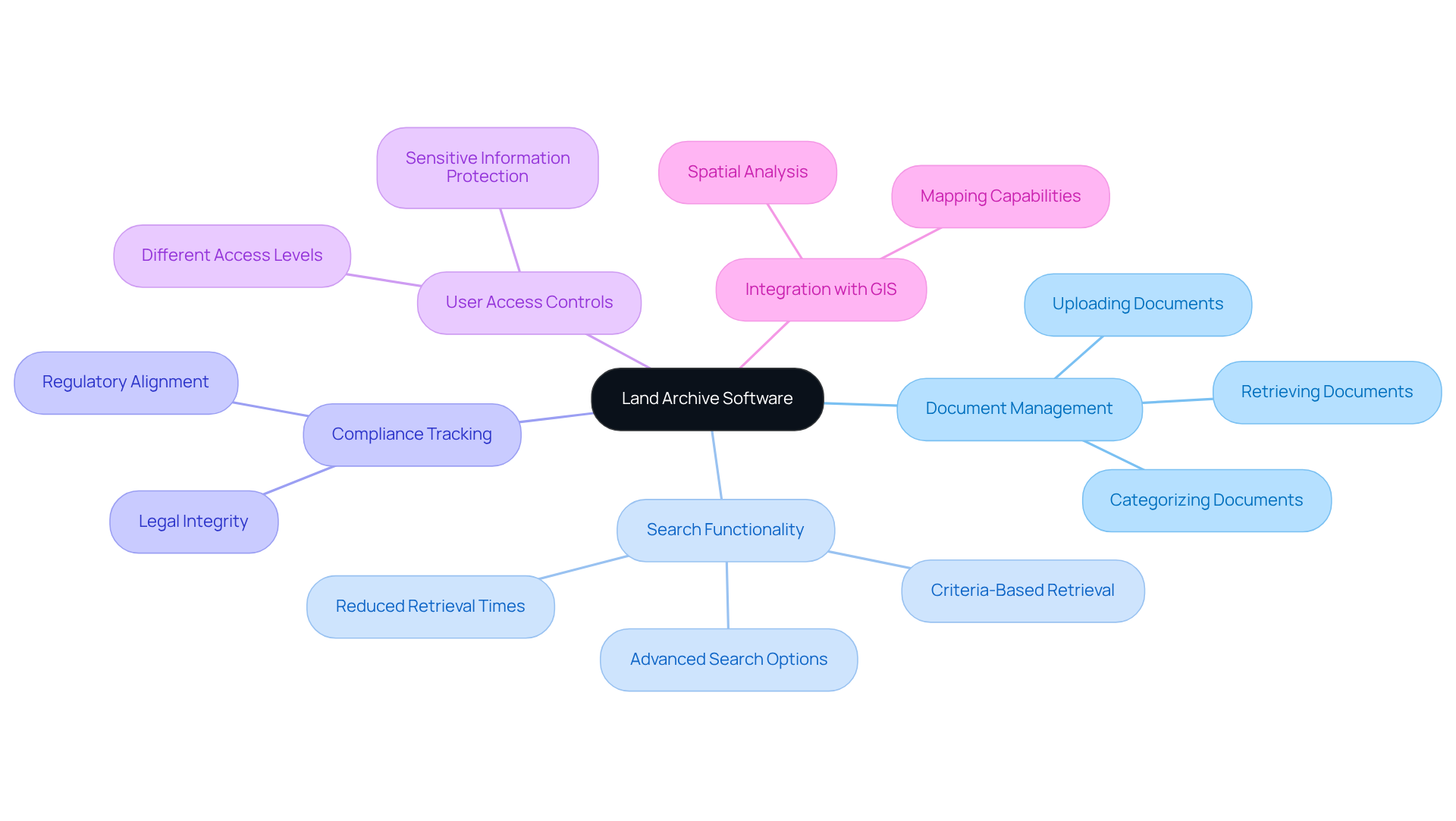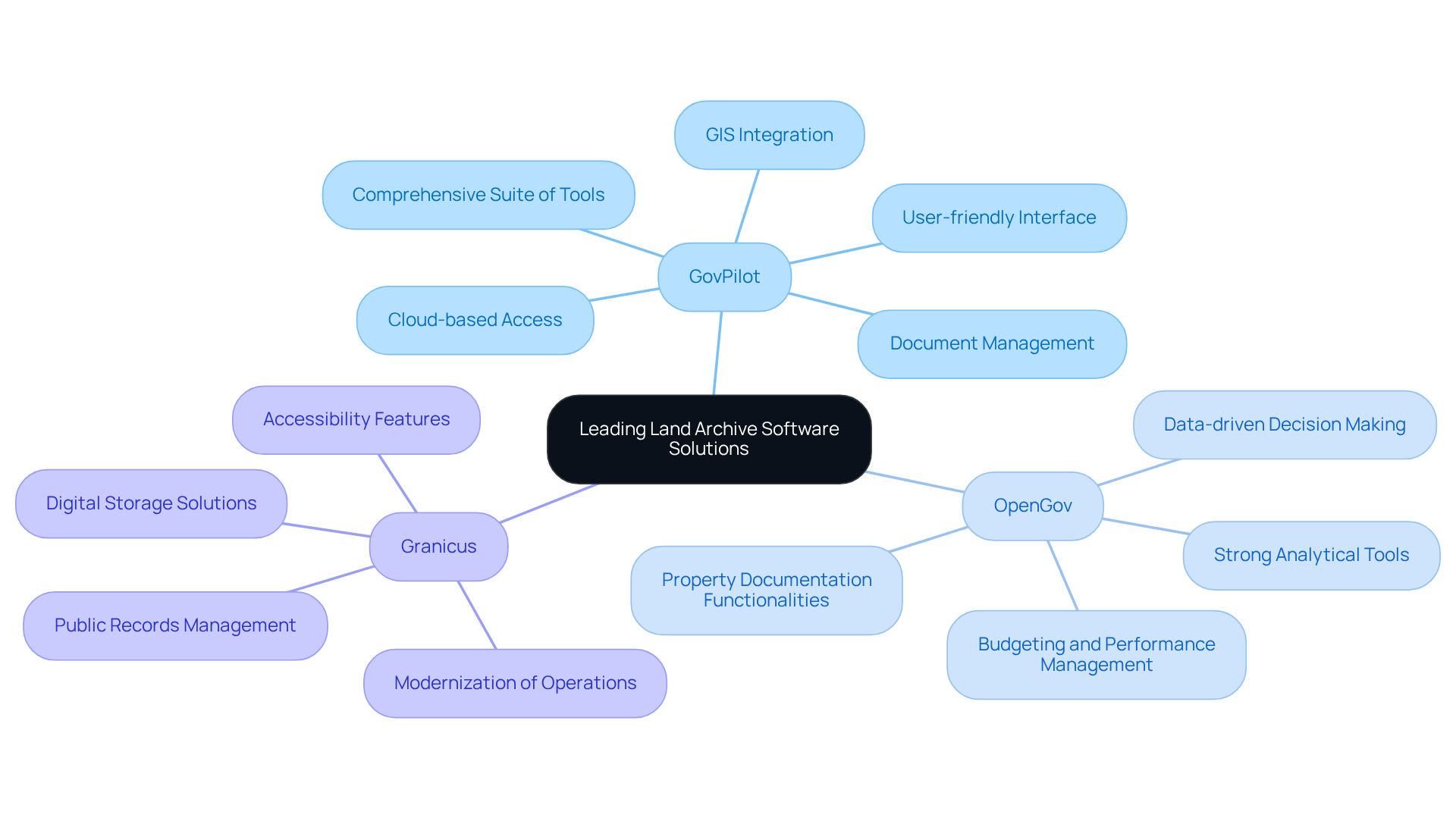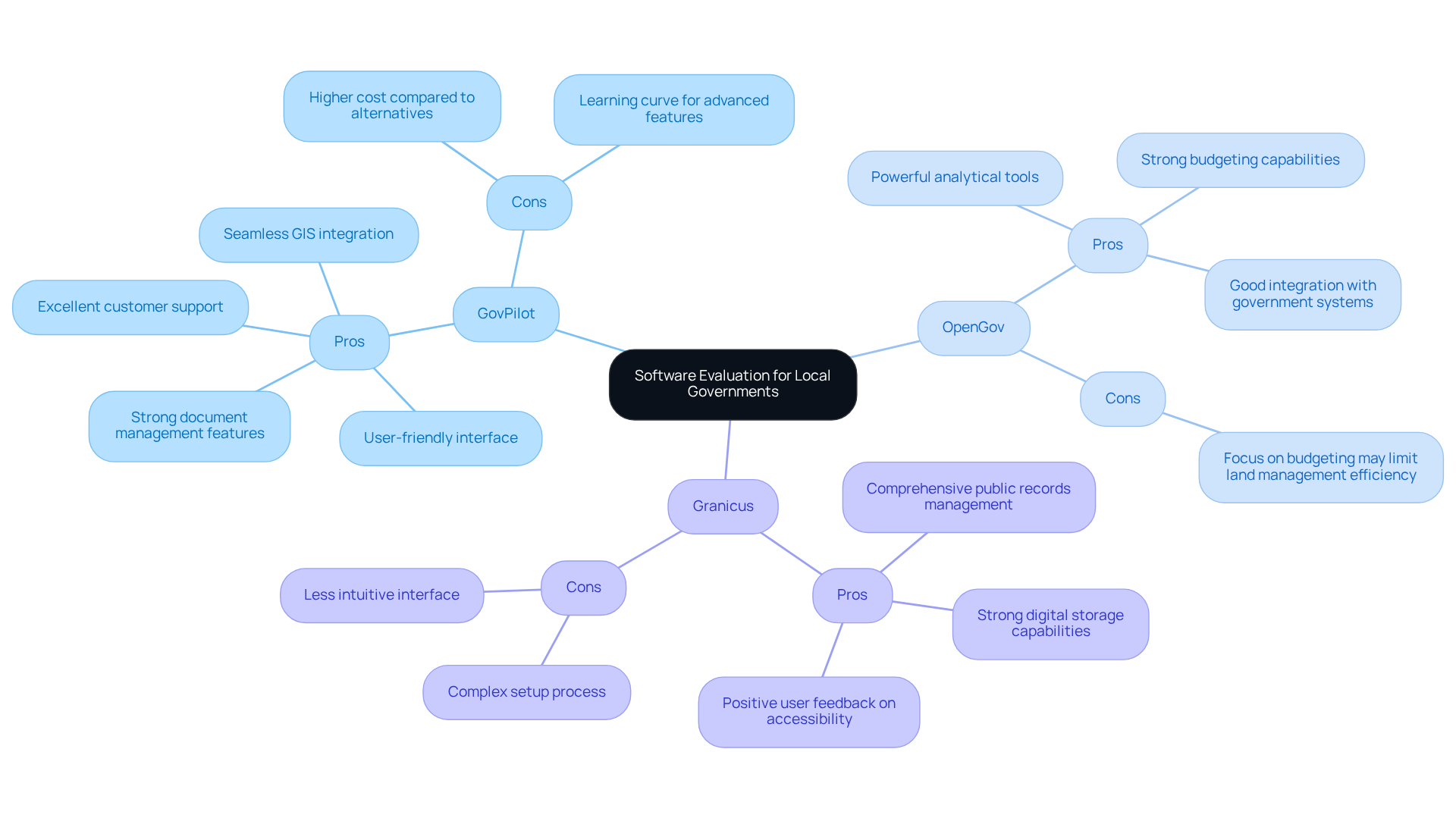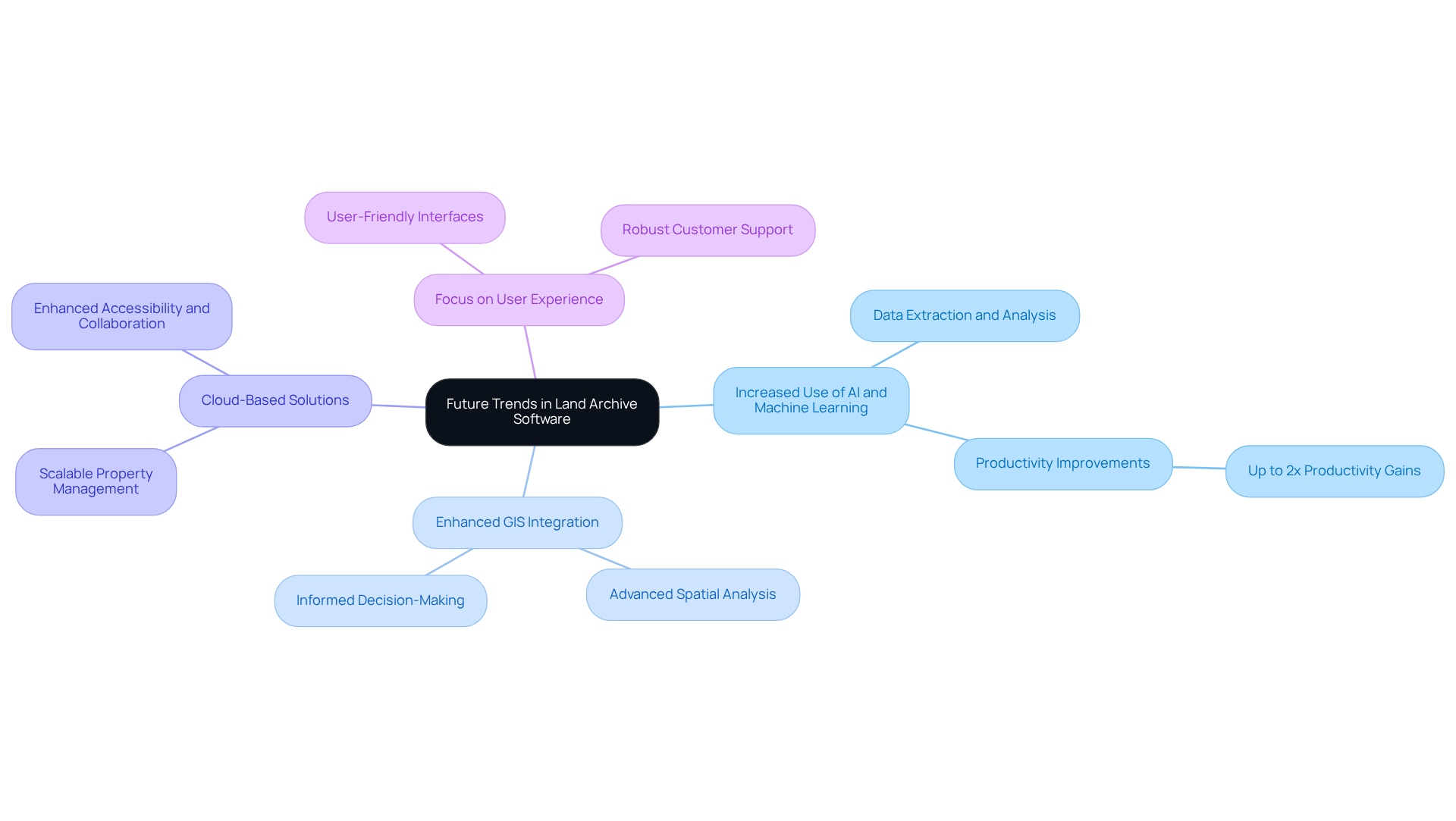Overview
This article provides a comprehensive comparison of land archive software solutions tailored for local governments, emphasizing key features, advantages, and disadvantages of leading options. It underscores the unique strengths of software such as GovPilot, OpenGov, and Granicus, each designed to meet specific administrative needs. Furthermore, it highlights the critical role of emerging technologies, including AI and cloud computing, in enhancing efficiency and service delivery within local government operations.
Introduction
Effective management of land records is increasingly critical for local governments striving for transparency and efficiency. This article explores the essential features and benefits of land archive software, demonstrating how these tools can streamline document management and enhance compliance with regulations.
However, with a plethora of options available, local administrations face the challenge of determining which software best meets their unique needs. By comparing leading solutions such as:
- GovPilot
- OpenGov
- Granicus
this analysis uncovers not only the strengths and weaknesses of each but also the emerging trends that may shape the future of land record management.
Understanding Land Archive Software: Key Features and Functions
The effective management, storage, and retrieval of documents is essential, which can be achieved through . Its key features include:
- : This functionality allows users to upload, categorize, and retrieve various land documents, such as deeds, titles, and surveys, streamlining the documentation process.
- Search Functionality: enable users to quickly locate specific entries based on criteria like property owner, parcel number, or document type, significantly reducing retrieval times.
- : The software ensures that all documentation aligns with local, state, and federal regulations, which is crucial for upholding legal integrity in local government operations.
- : Different access levels for various users safeguard sensitive information while ensuring that authorized personnel can easily access essential documents.
- Integration with GIS: Many property archive systems incorporate Geographic Information Systems (GIS), providing spatial analysis and mapping capabilities that enhance decision-making processes.
These characteristics collectively enhance the effectiveness and precision of , making [land archive software for local governments](https://blog.harbingerland.com/streamlining-land-acquisition-with-advanced-software-solutions) essential for municipal operations. As the is projected to grow from $8.32 billion in 2025 to $24.34 billion by 2032, with a compound annual growth rate (CAGR) of 16.6%, the importance of these systems in maintaining organized and accessible property documentation cannot be overstated. Industry leaders emphasize that efficient [document management](https://pdfreaderpro.com/blog/document-management-statistics) not only boosts operational effectiveness but also supports compliance and transparency in property transactions. For example, self-service options in places like Peoria, Illinois, and Lyon County, Nevada, have notably improved public access to records, illustrating the practical advantages of these systems.

Comparative Analysis of Leading Land Archive Software Solutions
In this comparative analysis, we examine three leading solutions for for local governments: GovPilot, OpenGov, and Granicus.
- GovPilot is recognized for its and comprehensive features. It offers robust and GIS integration, excelling in optimizing workflows for regional authorities. This makes it a popular choice among local administrations.
- OpenGov focuses primarily on , while also incorporating property documentation functionalities. Its analytical tools are particularly strong, assisting in making that enhance operational efficiency.
- Granicus offers a suite of solutions for , which features to handle land records. Its emphasis on positions it as a compelling option for organizations seeking to modernize their operations.
Each of these solutions possesses unique strengths, making them suitable for various types of local administration needs.

Pros and Cons of Each Software: Evaluating Suitability for Local Governments
Here’s a breakdown of the pros and cons of each software solution:
-
GovPilot:
- Pros: The user-friendly interface enhances accessibility, complemented by strong . Excellent customer support and seamless GIS integration further strengthen its appeal.
- Cons: It may be more expensive than some alternatives, and some users report encountering a learning curve for advanced features.
-
OpenGov:
- Pros: This solution offers powerful analytical tools and , with good integration with other government systems.
- Cons: Its primary concentration on budgeting may restrict its efficiency for dedicated land management tasks.
-
Granicus:
- Pros: Comprehensive and strong digital storage capabilities are significant advantages, alongside positive user feedback regarding accessibility.
- Cons: The setup process can be complex, and some users find the interface less intuitive compared to competitors.
This assessment assists regional authorities in identifying which software aligns best with their operational requirements and financial limitations.

Future Trends in Land Archive Software for Local Governments
As technology continues to evolve, several key trends are influencing .
- Increased Use of : The integration of AI and machine learning is revolutionizing data extraction and analysis. This advancement enables local governments to efficiently manage extensive volumes of land records. Consequently, this shift is expected to , with organizations leveraging these technologies reporting productivity improvements of up to two times across various sectors.
- Enhanced GIS Integration: Future software solutions are anticipated to feature deeper integration with . This will facilitate , enabling regional authorities to make more informed choices based on comprehensive geographic insights.
- Cloud-Based Solutions: The continuous shift to is poised to offer regional authorities scalable and economical choices for property management. This trend aligns with the broader industry movement, where cloud adoption is projected to grow significantly, providing enhanced accessibility and collaboration.
- Focus on User Experience: As competition intensifies, software providers are increasingly prioritizing and robust customer support. This emphasis on user experience is essential for attracting and retaining clients, ensuring that regional authorities can navigate their software solutions with ease.
By staying attuned to these trends, local governments can strategically prepare for the future of land record management with land archive software for local governments. Leveraging technology will enhance efficiency and service delivery.

Conclusion
The exploration of land archive software for local governments underscores its critical role in enhancing document management and operational efficiency. By concentrating on essential features such as:
- Document management
- Advanced search capabilities
- Compliance tracking
- User access controls
- GIS integration
local governments can significantly streamline their property documentation processes. A comparative analysis of leading software solutions—GovPilot, OpenGov, and Granicus—highlights the diverse strengths and functionalities available to municipal administrations, ensuring they can select the best fit for their specific needs.
Throughout the article, essential insights regarding the pros and cons of each software option were shared, aiding local authorities in making informed decisions. Furthermore, the discussion emphasized the importance of staying current with future trends, including:
- The integration of AI
- Enhanced GIS capabilities
- The shift towards cloud-based solutions
These developments promise not only to improve efficiency but also to elevate the user experience, facilitating effective management of land records for local governments.
In light of these findings, it is imperative for local governments to prioritize the selection of appropriate land archive software that aligns with their operational requirements and long-term goals. Embracing these technological advancements will not only enhance property management but also foster greater transparency and compliance, ultimately benefiting the communities they serve. As the landscape of land archive software evolves, proactive engagement with these tools will be essential for local governments aiming to optimize their operations and deliver superior services to their constituents.
Frequently Asked Questions
What is land archive software?
Land archive software is a tool designed for local governments to effectively manage, store, and retrieve land-related documents such as deeds, titles, and surveys.
What are the key features of land archive software?
Key features include document management, advanced search functionality, compliance tracking, user access controls, and integration with Geographic Information Systems (GIS).
How does document management work in land archive software?
Document management allows users to upload, categorize, and retrieve various land documents, streamlining the documentation process.
What is the importance of search functionality in land archive software?
Advanced search options enable users to quickly locate specific entries based on criteria like property owner, parcel number, or document type, significantly reducing retrieval times.
How does compliance tracking function in this software?
Compliance tracking ensures that all documentation aligns with local, state, and federal regulations, which is crucial for maintaining legal integrity in local government operations.
What are user access controls, and why are they important?
User access controls provide different access levels for various users, safeguarding sensitive information while ensuring that authorized personnel can easily access essential documents.
How does integration with GIS enhance land archive software?
Integration with GIS provides spatial analysis and mapping capabilities that enhance decision-making processes related to property management.
What is the projected growth of the document management system market?
The document management system market is projected to grow from $8.32 billion in 2025 to $24.34 billion by 2032, with a compound annual growth rate (CAGR) of 16.6%.
Why is efficient document management essential for local governments?
Efficient document management boosts operational effectiveness, supports compliance, and enhances transparency in property transactions.
Can you provide examples of practical advantages of land archive software?
Self-service options in places like Peoria, Illinois, and Lyon County, Nevada, have notably improved public access to records, illustrating the practical advantages of these systems.




